embrella educational courses are free to all licensed resource and kinship families throughout New Jersey to ensure you can meet the Department of Children and Families (DCF), Office of Licensing (OOL) educational requirements.
Whether a traditional resource family or a kinship family, both are considered licensed resource families in New Jersey, and therefore every licensed parent in the home must complete educational in-service training hours during each three-year licensing cycle while the home is open to ensure that our children receive the best care possible. embrella courses are also available to kinship caregivers that are pending licensing but have a child with them at the time of the course request. All embrella courses are pre-approved and assigned credit hours by DCF.
New Jersey Resource Parent In-Service Training Licensing Requirements
Primary Provider – 7 hours annually or 21 hours over a 3-year licensing cycle
Secondary Provider – 5 hours annually or 15 hours over a 3-year licensing cycle.
All of our courses are developed to address various successes and challenges you may encounter while caring for our children. We strive to support you with skills to be successful, no matter the type of care you provide. All of our courses are evidence and trauma-informed and are developed to ensure accessibility, as well as convenience.
I appreciate the design and the topics of embrella courses. The reading is informative but not dry. Thank you for offering this kind of assistance to new resource parents like myself.
This course is very useful especially since my license is due for renewal in a couple months.
This webinar was a great experience! I will def come back and do another one! Thank you for offering this to us, it really means a lot.
Our Courses
Please note, courses do not have to be taken in a specific order. In addition, all courses may not be available at all times and are subject to change or removal.
If you need assistance you can reach out to your assigned Family Support Advocate to review the best courses for you.
Course Format Options
Webinar Courses
Webinar courses are interactive, virtual classes taught by a live instructor. Participants are able to connect with the instructor and fellow resource and kinship parents to share knowledge, experiences, and support. These courses are prescheduled and prior registration is required. Webinar courses can be accessed on a computer, laptop, or mobile device. Register here.
Webinars traditionally are presented by outside agencies that are experts in child welfare. If you are an agency interested in presenting webinars to New Jersey resource and kinship caregivers, please contact us here.
e-Learning Courses
e-Learning courses are online courses that you can take at any time that is convenient for you. e-Learning courses can be accessed on a computer, laptop, or mobile device and can be completed at your own pace.
e-Learning courses can be accessed by going to www.teachingfamilies.org. To create an account, click on the register link and follow the instructions provided.
Community Workshops
Live workshops are held throughout all areas in New Jersey by your area Family Support Advocate. Community workshops can take place in-person, virtually, or in a hybrid model.
At our workshops, you will have the opportunity to learn valuable information, receive in-service hours if applicable, and find out what is happening with embrella and your community.
Home Correspondence Courses (HCC)
These educational booklets are mailed or emailed to you to complete at your own pace. Simply complete the test questions, registration, and course evaluation and send them back to us for credit.
The booklet is yours to keep for future reference. Correspondence courses are sent one at a time, and the next registered course will not be sent until your original questions and evaluation are received.
These courses can be accessed here or by calling us at 800.222.0047.
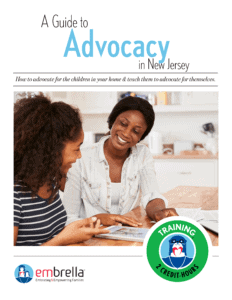
2 Credit Hours
Learn to advocate in real-life situations and understand the organizations in New Jersey that provide support and advocacy services to both you and the children you care for.
Format Options:
Home Correspondence Course
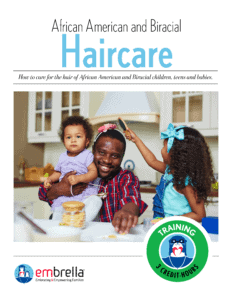
3 Credit Hours
Acquire knowledge of the appropriate tools and products for daily hair care management for African American and Biracial children and youth as well as learn common styling techniques.
Format Options:
Home Correspondence Course
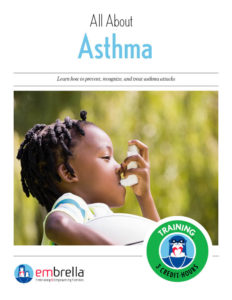
3 Credit Hours
Learn how to recognize, treat, and prevent asthma attacks.
Format Options:
Home Correspondence Course
e-Learning
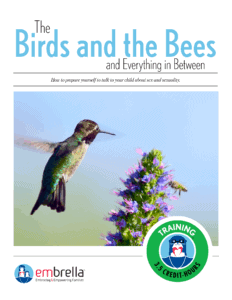
3.5 Credit Hours
Learn best practices to prepare yourself to talk to youth about sex and sexuality.
Format Options:
Home Correspondence Course
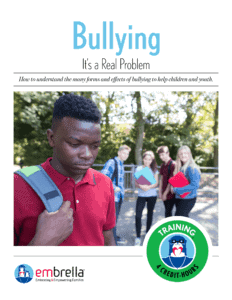
4 Credit Hours
Obtain strategies for helping children and youth involved in bullying through understanding the different forms of bullying, the effects of bullying, and the warning signs to watch out for.
Format Options:
Home Correspondence Course
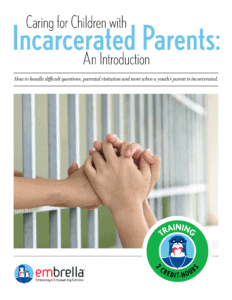
2 Credit Hours
Gain ways to support children and youth through better understanding your role when working with the criminal justice system.
Format Options:
Home Correspondence Course
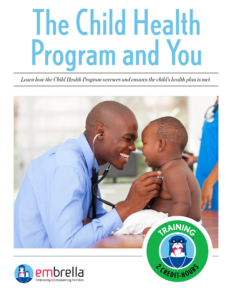
2 Credit Hours
Learn about the basic health needs of children in care and how the Child Health Program oversees and ensures that each child’s health plan it met.
Format Options:
e-Learning
Disponible en Español
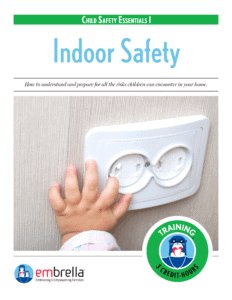
3 Credit Hours
Learn to keep children safe with an in-depth review of all the harmful risks children encounter in your home.
Format Options:
Home Correspondence Course
e-Learning
Disponible en Español
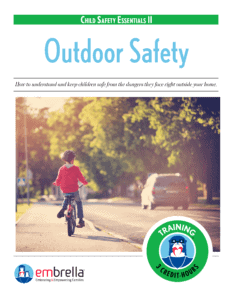
3 Credit Hours
Enhance your understanding of child safety and the dangers that children face when right outside your home.
Format Options:
Home Correspondence Course
e-Learning
Disponible en Español
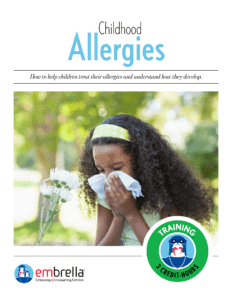
3 Credit Hours
Learn how to keep allergies in check by understanding what they are, how they develop, types, treatments, and common myths.
Format Options:
Home Correspondence Course
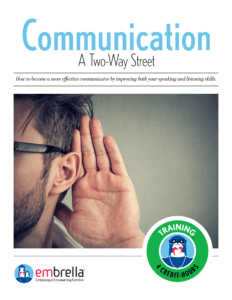
4 Credit Hours
Improve your skills as a speaker and listener to enhance communication in your home and with the children in your care.
Format Options:
Home Correspondence Course
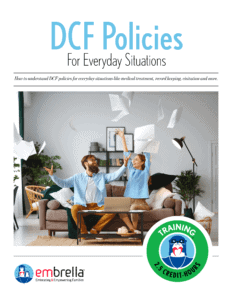
2.5 Credit Hours
Enhance your knowledge of key policies that directly affect you and the children you care for.
Format Options:
Home Correspondence Course
e-Learning
Community Workshop
Disponible en Español
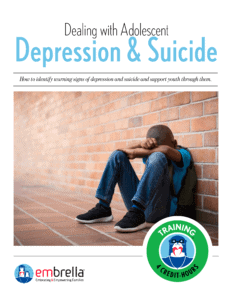
4 Credit Hours
Recognize warning signs of depression and suicide while being empowered to be more aware and confident in understanding, identifying, and responding to youth in need.
Format Options:
Home Correspondence Course
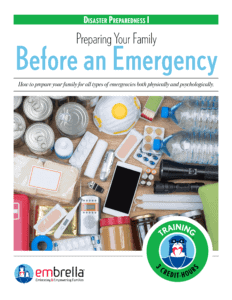
3 Credit Hours
Learn the basics of preparedness while following CP&P policy as well as steps you can take now to ensure your family’s safety if a disaster strikes.
Format Options:
Home Correspondence Course
e-Learning
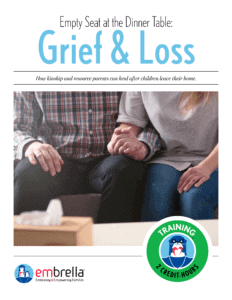
2 Credit Hours
Acquire an understanding of the different types of grief children and kinship and resource caregivers can experience and ways you and members of your family can prepare for and manage grief.
Format Options:
Home Correspondence Course
Community Workshop
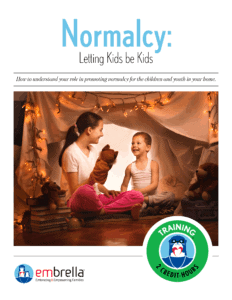
2 Credit Hours
Comprehend updated laws and policies which shift more decision-making to resource caregivers about children and youth in their care, in order to provide them with the opportunities and experiences all young people should have.
Format Options:
Home Correspondence Course
e-Learning
Community Workshop
Disponible en Español
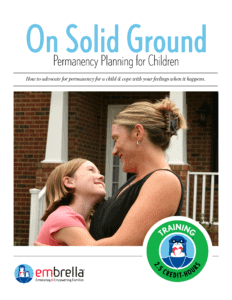
2.5 Credit Hours
Discover methods and procedures used to achieve permanency for children in care while also learning the critical impacts lack of permanency can have on children.
Format Options:
Home Correspondence Course
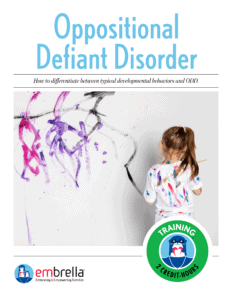
2 Credit Hours
Obtain a comprehensive knowledge of this behavioral disorder through being able to differentiate behaviors linked to child development versus behaviors that are connected to this disorder and know when psychological intervention is needed.
Format Options:
Home Correspondence Course
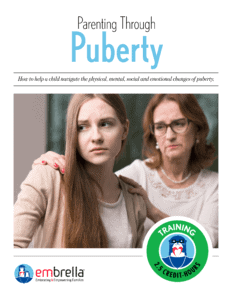
2.5 Credit Hours
Become prepared to care for children that may be experiencing puberty while with your family through awareness of possible challenges and insight into parenting approaches.
Format Options:
e-Learning
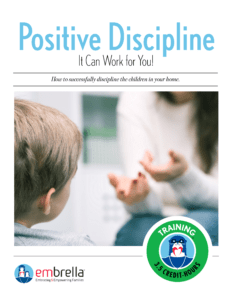
3.5 Credit Hours
Understand the difference between discipline and punishment while also gaining new skills to discipline children effectively, so negative behaviors decrease and self-esteem increases.
Format Options:
Home Correspondence Course
e-Learning
Disponible en Español
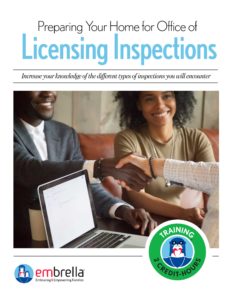
2 Credit Hours
Increase your knowledge of the different types of inspections you will encounter as a licensed kinship and resource caregiver in New Jersey and ways you can prepare for a successful inspection.
Format Options:
e-Learning
Community Workshop
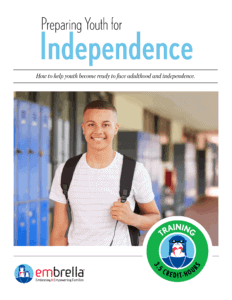
3.5 Credit Hours
Develop your skills in building relationships with youth and gain resources to strengthen your support to them as they prepare for adulthood.
Format Options:
Home Correspondence Course
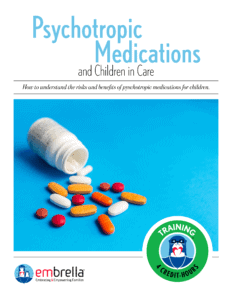
4 Credit Hours
Obtain information on both the risks and benefits of psychotropic medication through learning the steps taken when considering this type of medication, who the decision-makers are, the responsibilities of all involved, and the accountability kinship and resource caregivers have for a child’s health and well-being.
Format Options:
Home Correspondence Course
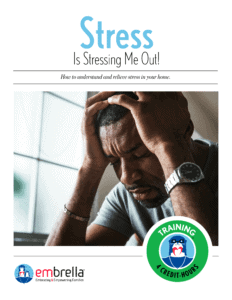
4 Credit Hours
Develop new ways to handle stress while learning common causes, warning signs, and symptoms of stress that affect children and adults.
Format Options:
Home Correspondence Course
e-Learning
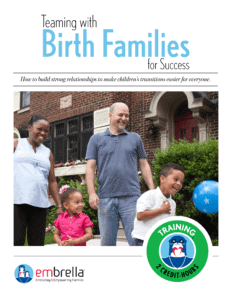
2 Credit Hours
Gain skills in building positive working relationships with families and learn tips for working with reluctant families and helping children transition home.
Format Options:
Home Correspondence Course
Community Workshop
Disponible en Español
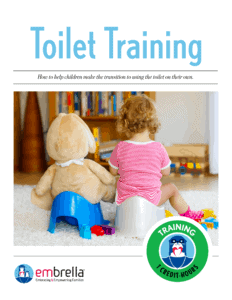
1 Credit Hour
Increase your ability to navigate this milestone by learning signs that a child is ready, the preparation involved, the process, and areas that may be problematic due to trauma and medical needs of children that may join your family.
Format Options:
Home Correspondence Course
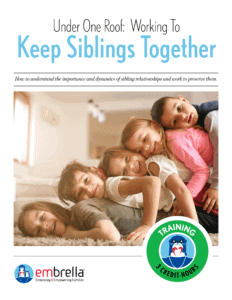
3 Credit Hours
Discover the importance of sibling relationships through studying the dynamics of siblings and the additional trauma sibling separations can cause.
Format Options:
Home Correspondence Course
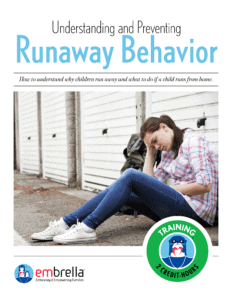
2 Credit Hours
Explore why children and youth run away and develop skills to prevent these behaviors and the actions to take if a child or youth runs away.
Format Options:
Home Correspondence Course
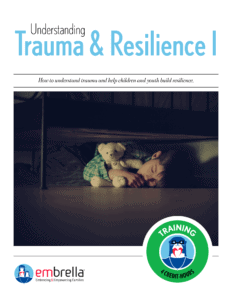
4 Credit Hours
Gain a strong awareness of trauma by learning its themes, how it manifests in daily living, and strategies to support and build resilience in children and youth.
Format Options:
Home Correspondence Course
Disponible en Español
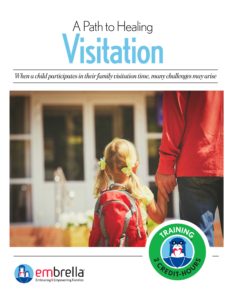
2 Credit Hours
When a child participates in their family visitation time, many challenges may arise. We will discuss various approaches to help you prepare for and address these concerns.
Format Options:
e-Learning
Community Workshop
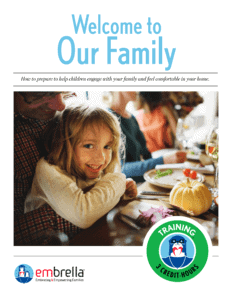
3 Credit Hours
Prepare for a child to join your family by learning steps to take in preparation, ways to make a child feel comfortable, and how to engage your family members.
Format Options:
Home Correspondence Course
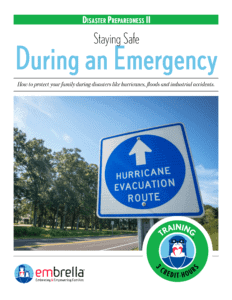
3 Credit Hours
Know what to do during any disaster through understanding types of disasters, details on evacuating or taking shelter, and when to act.
Format Options:
Home Correspondence Course
e-Learning
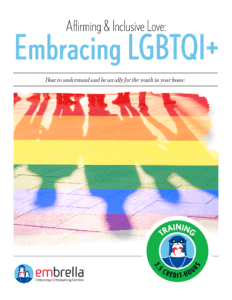
3.5 Credit Hours
Gain an enhanced understanding of the LGBTQI+ community and our youth who identify in one or more of these groups.
Format Options:
Home Correspondence Course
e-Learning
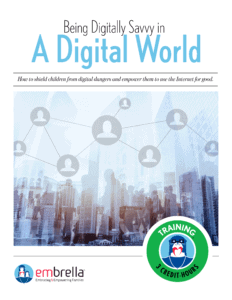
3 Credit Hours
Enhance your knowledge of technology that children and youth use daily and build approaches to protect children in your home from online risks and predators.
Format Options:
Home Correspondence Course
Community Workshop
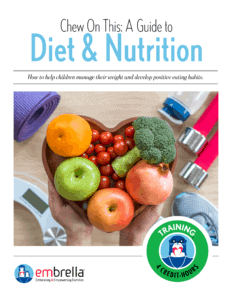
4 Credit Hours
Obtain insight into appropriate versus inappropriate weight control methods while learning the benefits of nutrition and working as a family to stay healthy.
Format Options:
Home Correspondence Course
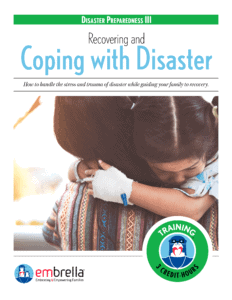
3 Credit Hours
Learn how to rebuild after a disaster strikes by exploring the types of assistance available and how to access assistance.
Format Options:
Home Correspondence Course
e-Learning
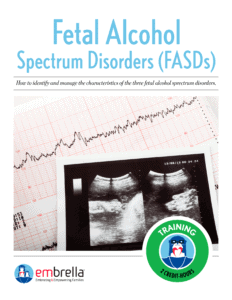
2 Credit Hours
Gain an understanding of the characteristics of fetal alcohol spectrum disorders and how to manage these distinct characteristics.
Format Options:
Home Correspondence Course
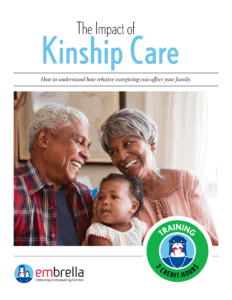
2 Credit Hours
Grasp the ways in which caring for a family member or friend’s children will impact you and your home and be prepared to deal with both the challenges and joys of kinship care.
Format Options:
Home Correspondence Course
e-Learning
Disponible en Español
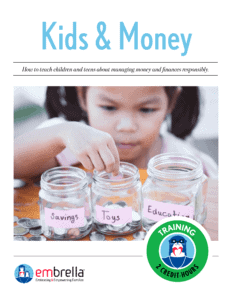
2 Credit Hours
Learn how to teach money management and responsible finances to children and youth of all ages to ensure they understand financial importance and goal setting.
Format Options:
Home Correspondence Course
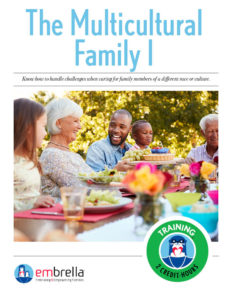
2 Credit Hours
Know how to handle challenges that may arise when caring for family members of a different race or culture through understanding culture, societal issues, identity, and practical ways to handle challenges when they arise.
Format Options:
e-Learning
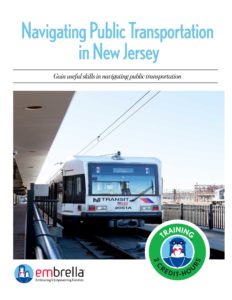
2 Credit Hours
Gain useful skills in navigating public transportation such as types of transportation available, public transportation etiquette, and accessible services.
Format Options:
e-Learning
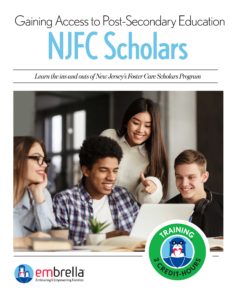
2 Credit Hours
Learn the ins and outs of New Jersey’s Foster Care Scholars Program to aid eligible youth in gaining access to post-secondary education.
Format Options:
e-Learning
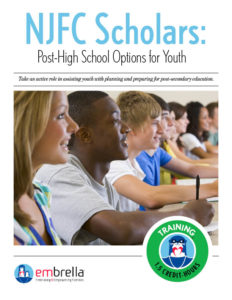
1.5 Credit Hours
Take an active role in assisting youth with planning and preparing for post-secondary education through understanding the common paths youth take after high school such as continuing their education, joining the workforce, or enlisting in the military.
Format Options:
e-Learning
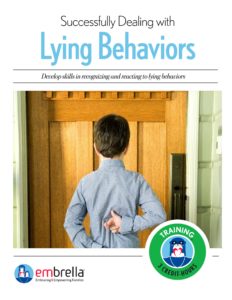
3 Credit Hours
Develop skills in recognizing and reacting to lying behaviors through learning about lying and its connection to trauma in children.
Format Options:
e-Learning
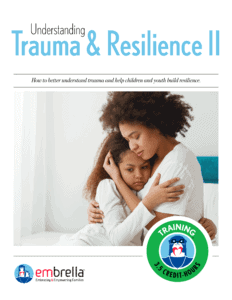
3.5 Credit Hours
Increase your knowledge of trauma and resilience through exploring strength-driven approaches that are geared to support children and youth in building a resilient mindset.
Format Options:
Home Correspondence Course
Disponible en Español
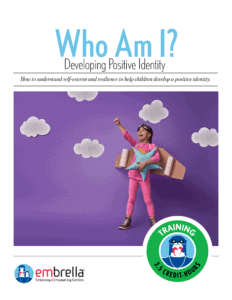
3.5 Credit Hours
Gain strategies to assist children in developing positive identities by grasping the importance of self-esteem and resilience and how these roles connect to child development.
Format Options:
Home Correspondence Course
Community Workshop
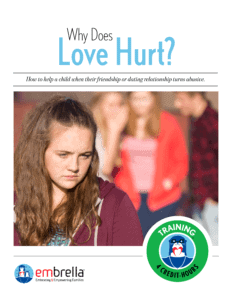
4 Credit Hours
Further protect youth in your care from abusive relationships by being able to distinguish potential abusive friendships and dating relationships, knowing warning signs, and knowing how to develop a safety plan.
Format Options:
Home Correspondence Course
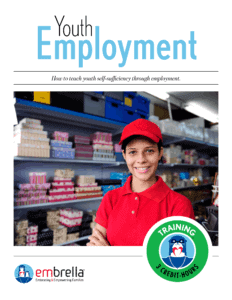
3 Credit Hours
Help youth achieve self-sufficiency by aiding them with obtaining employment, including how to find employment, the interview process, budgeting, and career selection.
Format Options:
Home Correspondence Course
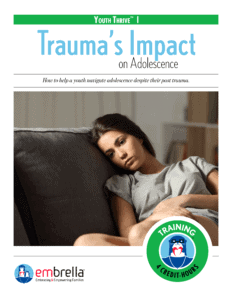
4 Credit Hours
Be prepared to assist youth who have suffered trauma by examining two of the five protective factors to enhance healthy development and well-being while understanding adolescent development, including trauma’s effects on brain development, and social connections.
Format Options:
Home Correspondence Course
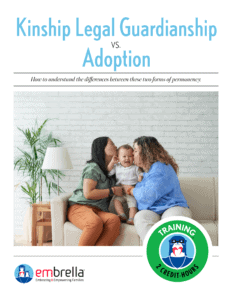
2 Credit Hours
Understand the different permanency options available to kinship caregivers and the children they care for when family reunification is not possible.
Format Options:
Home Correspondence Course
e-Learning
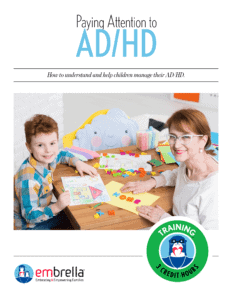
3 Credit Hours
Understand the difficulties associated with this disorder while finding the most effective methods of managing symptoms associated with AD/HD.
Format Options:
Home Correspondence Course
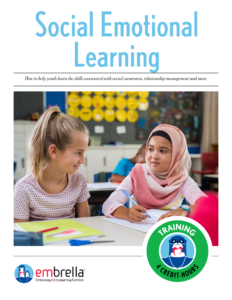
4 Credit Hours
Help children learn vital social and emotional skills by studying social awareness, relationship management, self-awareness, self-management, and responsible decision making.
Format Options:
Home Correspondence Course
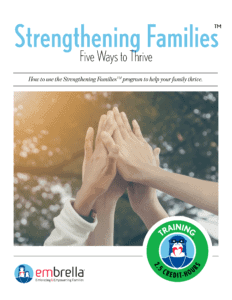
2.5 Credit Hours
Help children and their families thrive through this program by learning the five protective factors and how they help build important social and emotional life skills and buffer the effects of trauma.
Format Options:
Home Correspondence Course
Community Workshop
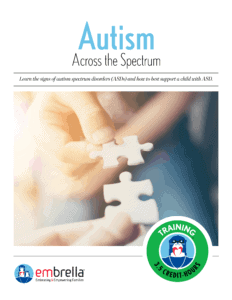
3.5 Credit Hours
Become prepared to care for children and youth with this developmental disability through examining characteristics, diagnosis, treatment strategies, and resources available to assist you.
Format Options:
Home Correspondence Course
e-Learning
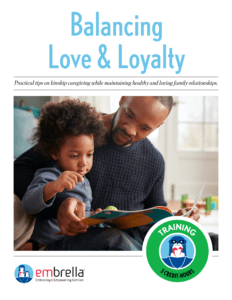
3 Credit Hours
Learn about the connection between boundaries and kinship care and identify strategies to help set and maintain healthy boundaries as you adjust to your new role as a kinship caregiver.
Format Options:
Home Correspondence Course
Community Workshop
Disponible en Español
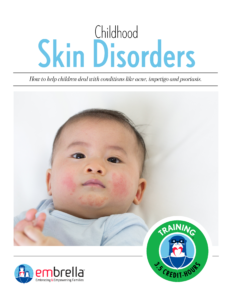
3.5 Credit Hours
Understand the symptoms, treatment, and prognosis for complex skin disorders such as impetigo, eczema, and psoriasis, as well as less severe skin conditions such as acne and diaper rash.
Format Options:
Home Correspondence Course
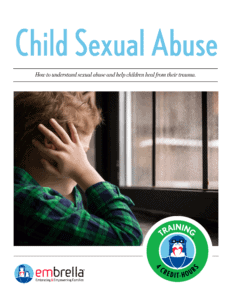
4 Credit Hours
Be prepared to support a child or youth who is a victim of sexual abuse by recognizing signs of trauma and understanding criminal law and how these areas can affect a licensed caregiver while helping the child.
Format Options:
Home Correspondence Course
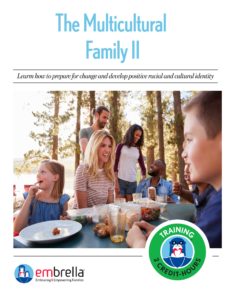
2 Credit Hours
Be equipped to deal with awkward and intrusive questions when caring for family members of a different race or culture by learning how to prepare for change and developing positive racial and cultural identity.
Format Options:
e-Learning
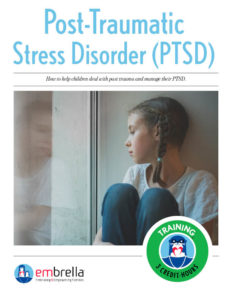
3 Credit Hours
Learn how trauma can lead to PTSD in children and youth by examining signs, diagnosis, and treatment options as well as gain skills to help children and youth cope with this disorder.
Format Options:
Home Correspondence Course
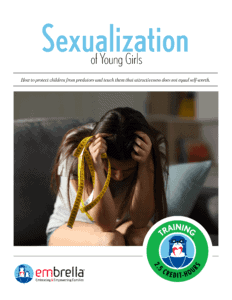
2.5 Credit Hours
Develop skills to further protect young children from sexualization by exploring factors that contribute to sexualized behaviors in children and ways society targets female children directly.
Format Options:
Home Correspondence Course
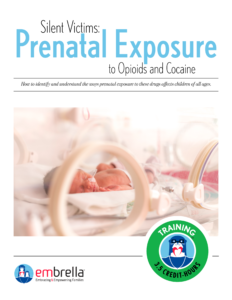
3.5 Credit Hours
Be able to care for infants exposed to narcotics by studying the effects on infants and their development as well as gain techniques to help infants and young children cope with these effects.
Format Options:
Home Correspondence Course
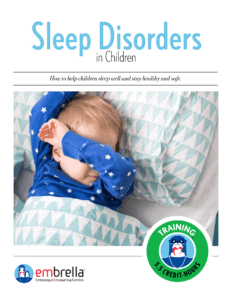
5.5 Credit Hours
Expand your knowledge of various sleep disorders such as apnea, bedwetting, sleepwalking, and nightmares through understanding symptoms and treatment to better care for children and youth who may suffer from a sleep disorder.
Format Options:
Home Correspondence Course
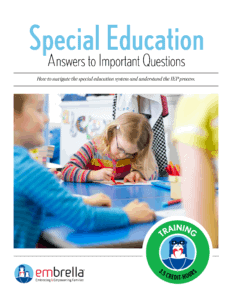
3.5 Credit Hours
Learn ways to navigate special education services with the school system and ways to manage the IEP process.
Format Options:
Home Correspondence Course
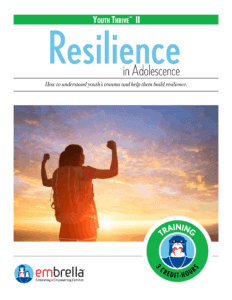
3 Credit Hours
Be prepared to assist youth who have suffered trauma by examining three of the five protective factors to enhance healthy development and well-being while understanding cognitive and social-emotional competence, concrete support in times of need and youth resilience.
Format Options:
Home Correspondence Course
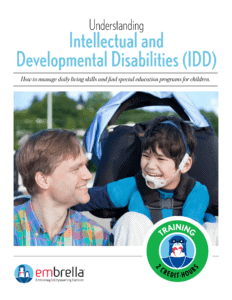
2 Credit Hours
Obtain ways to manage daily living skills and find the best programs for children and youth with IDD.
Format Options:
Home Correspondence Course
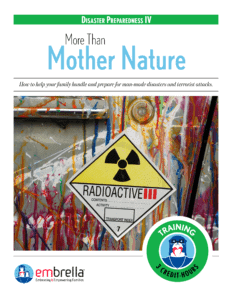
3 Credit Hours
Recognize different types of man-made disasters and how you can prepare your family for them.
Format Options:
Home Correspondence Course
e-Learning
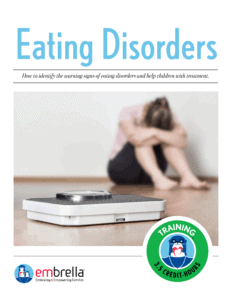
3.5 Credit Hours
Understand the root causes of different eating disorders such as anorexia and bulimia. Learn warning signs and gain tools to assist children and youth in your care who may be suffering from one of these disorders.
Format Options:
Home Correspondence Course
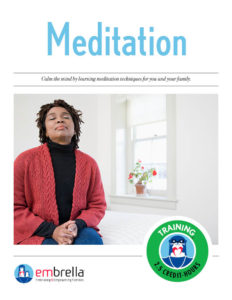
2.5 Credit Hours
Calm the mind by learning meditation techniques for you and your family, the physical, mental, and emotional benefits of meditation, and how to get children involved in this healing practice.
Format Options:
e-Learning
Community Workshops
Community Workships are live workshops held throughout all areas in New Jersey by your area Family Support Advocate. Community workshops can take place in-person, virtually, or in a hybrid model.
Participants have the opportunity to share experiences and connect with other resource and kinship parents. Be sure to check our online calendar for currently scheduled workshop dates, times, and locations.
The course topics found on this catalog webpage can be presented as a live Community-Based Workshop upon request. Please submit your request here. Please provide at least a two-month notice and a location for the workshop. Locations can include but are not limited to DCF offices and local community centers such as libraries, YMCA’s, and faith-based centers.

2 Credit Hours
When a child participates in their family visitation time, many challenges may arise. We will discuss various approaches to help you prepare for and address these concerns.
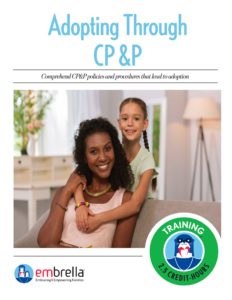
2.5 Credit Hours
Comprehend CP&P policies and procedures that lead to adoption and children becoming legally free through studying various aspects that occur in each step of the process.
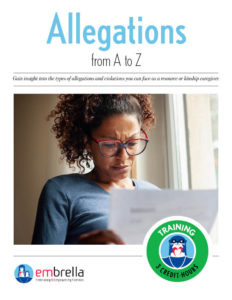
3 Credit Hours
Gain insight into the types of allegations and violations you can face as a resource or kinship caregiver as well as the CP&P investigation process and appropriate action you can take when you have an allegation.

3 Credit Hours
Learn about the connection between boundaries and kinship care and identify strategies to help set and maintain healthy boundaries as you adjust to your new role as a kinship caregiver.

3 Credit Hours
Coming Soon!
Enhance your knowledge of technology children and youth use daily and build approaches to protect children in your home from online risks and predators.
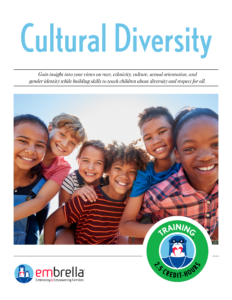
2.5 Credit Hours
Gain insight into your views on race, ethnicity, culture, sexual orientation, and gender identity while building skills to teach children about diversity and respect for all.

2.5 Credit Hours
Enhance your knowledge of key policies that directly affect you and the children you care for.

2 Credit Hours
Acquire an understanding of the different types of grief children and kinship and resource caregivers can experience and ways you and members of your family can prepare for and manage grief.
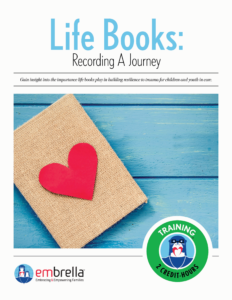
2 Credit Hours
Gain insight into life book creation and maintenance as well as their importance in building resilience to trauma for children and youth in care.
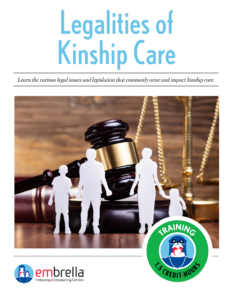
1.5 Credit Hours
Learn the various legal issues and legislation that commonly arise and impact kinship care while understanding the differences of adoption and kinship legal guardianship to better plan for kin in care.
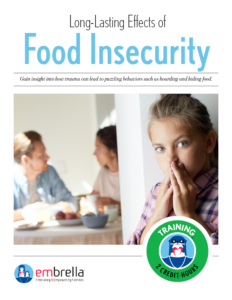
2 Credit Hours
Gain insight into how trauma can lead to puzzling behaviors such as hoarding and hiding food, how these issues differ from traditional eating disorders, and strategies to help children and youth develop a healthy, secure relationship with food.
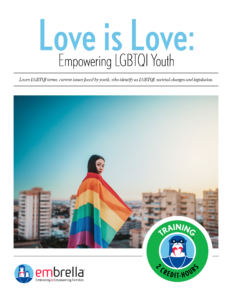
2 Credit Hours
Increase your understanding of LGBTQI terms, current issues faced by youth who identify as LGBTQI, societal changes, and legislation while also obtaining resources on safe spaces and community supports.
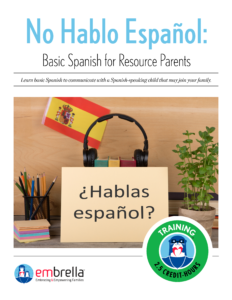
2.5 Credit Hours
Learn basic Spanish to communicate with a Spanish-speaking child who joins your family through studying the Spanish language sound system and simple vocabulary.

2 Credit Hours
Comprehend updated laws and policies which shift more decision-making to resource caregivers about the children and youth in their care, in order to provide them with the opportunities and experiences all young people should have.

2 Credit Hours
Coming Soon!
Increase your knowledge of the different types of inspections you will encounter as a licensed kinship and resource caregiver in New Jersey and ways you can prepare for a successful inspection.
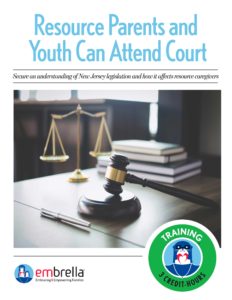
3 Credit Hours
Secure an understanding of New Jersey legislation and how it affects resource caregivers and youth attending court hearings such as the family’s permanency hearing.
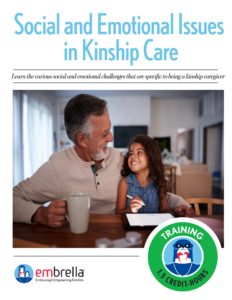
1.5 Credit Hours
Learn the various social and emotional challenges that are specific to being a kinship caregiver and ways to mediate these issues.
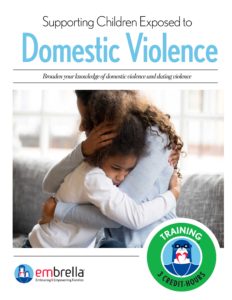
3 Credit Hours
Broaden your knowledge of domestic violence and dating violence that children and youth may experience as well as ways trauma from violence can impact children and youth.
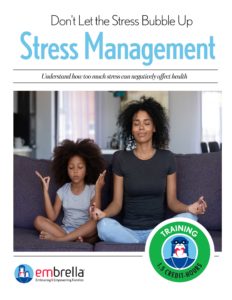
1.5 Credit Hours
Understand how too much stress can negatively affect health and gain tips on healthy stress management techniques to help you cope positively and be resilient during stressful times.

2 Credit Hours
Gain skills in building positive working relationships with families and learn tips for working with reluctant families and helping children transition home.
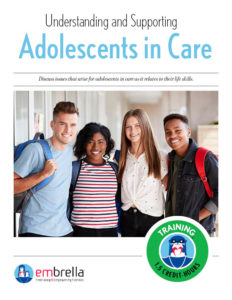
1.5 Credit Hours
Discuss issues that arise for adolescents in care as they relate to education, employment, housing stability, culture and community life, transportation, health care, and life skills as well as gain strategies to help you support and mentor the adolescent in your care.
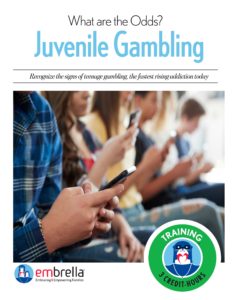
3 Credit Hours
Recognize the signs of teenage gambling, the fastest rising addiction today, and learn what you can do about it.

3.5 Credit Hours
Gain strategies to assist children in developing positive identities by grasping the importance of self-esteem and resilience and how these roles connect to child development.
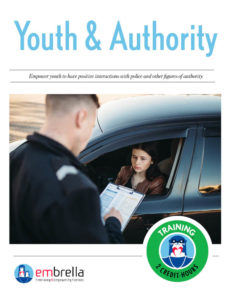
2 Credit Hours
Empower youth to have positive interactions with police and other figures of authority, examine community and policing societal issues, and provide youth with their rights during a police stop.
Transcripts
Your embrella Transcript is a record of all embrella courses you have completed which can be used towards your educational in-service training hour requirement. Once you complete an embrella course, your Transcript will be updated to reflect the course title, in-service hours, and the date completed. When requesting your transcript, ensure that you have your resource family license number as well as the three-year licensing cycle effective date handy. Please be advised embrella transcripts only reflect courses taken with embrella. If you take a course outside of embrella, please speak with your Resource Family Worker.
